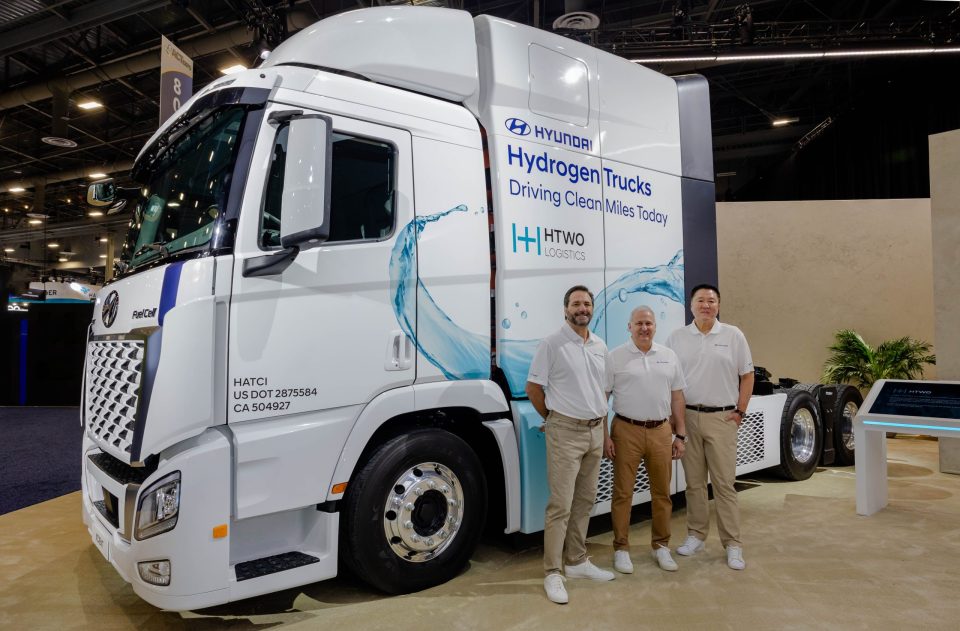
Buckle up, because the future of trucking is arriving ahead of schedule, and it's a collaboration built on clean energy and cutting-edge technology. Hyundai and Plus, two industry leaders, have joined forces to unveil the first-ever Level 4 autonomous hydrogen fuel cell truck in the United States. This isn't just a fancy prototype; it's a glimpse into a transportation landscape that's poised to be safer, more efficient, and significantly greener.

A Powerful Partnership for Progress
Hyundai, a global automotive giant known for its commitment to sustainable transportation, brings its expertise in hydrogen fuel cell technology to the table. Plus, a leader in autonomous driving software, contributes its industry-leading SuperDrive™ system. This powerful duo is setting a new standard for innovation in the trucking industry.
The XCIENT Fuel Cell Truck: A Technological Marvel
Imagine an 18-wheeler that glides down the highway, free of human error and powered by clean-burning hydrogen. That's the reality of the Hyundai XCIENT Fuel Cell truck. This Class 8 powerhouse has already proven its mettle in commercial operations around the world. Now, equipped with Plus's SuperDrive™, it's taking a groundbreaking leap into the realm of autonomous driving.

>> In Other News: [x](x)
The Magic Behind the Machine
Let's delve into the technology that makes this innovation possible. Hydrogen fuel cell technology offers a clean alternative to traditional diesel engines. The truck generates electricity through a chemical reaction between hydrogen and oxygen, producing nothing but water vapor as a byproduct. Plus's SuperDrive™ system acts as the truck's digital brain. Using a suite of high-tech sensors, including LiDAR, radar, and cameras, the system perceives its surroundings, plans its route, and anticipates potential hazards, all with the goal of safe and efficient autonomous operation.
A Future Filled with Benefits
The potential impact of this collaboration is nothing short of revolutionary. Here are some of the ways it could transform the trucking industry and beyond:
Enhanced Safety: Human error is a major contributor to road accidents. Autonomous trucks have the potential to significantly reduce collisions, creating a safer environment for everyone on the road.
Environmental Champion: By eliminating tailpipe emissions, hydrogen fuel cell trucks can drastically cut down on air pollution and contribute to global efforts to combat climate change.
Efficiency Powerhouse: Autonomous trucks can optimize routes and maintain consistent speeds, leading to improved fuel efficiency and reduced operating costs for logistics companies.
Shaping the Road Ahead
The implications of this partnership extend far beyond the trucking industry. It has the potential to influence industry standards and regulations, paving the way for wider adoption of autonomous and hydrogen-powered vehicles. Public perception and market readiness will also play a crucial role. However, with successful demonstrations like this one, public trust and industry acceptance are sure to follow.
Hyundai and Plus are not resting on their laurels. They have ambitious plans for future developments and scaling up this technology for wider adoption. This collaboration is a beacon of hope, not just for the trucking industry, but for the future of transportation as a whole. It's a testament to the power of human ingenuity and a glimpse into a cleaner, safer, and more efficient transportation landscape on the horizon. The road ahead may be paved with challenges, but with continued collaboration and innovation, the future of autonomous hydrogen fuel cell trucks is bright.
Subscribe to the newsletter
Daily decarbonization data and news delivered to your inbox
Follow the money flow of climate, technology, and energy investments to uncover new opportunities and jobs.
Latest issues
-
What Do Submarines Have to Do With Hydrogen?
Inside This Issue 🚢 Hyundai Pitches Hydrogen Transport Tied To Canada Submarine Bid 🧱 The LEGO Group Expands Its Portfolio Of Carbon Removal Solutions 🏆 SAF Pioneer LanzaJet Honored With RFA Indus...
-
This $4.1M Deal Could Change Carbon Capture's Playbook
Inside This Issue 🗜️ CarbonQuest Lands $4.1M Alberta Deal on Gas Compressors 🛡️ CADO, 123Carbon, and Assure SAF Registry Join Forces to Tackle SAF Integrity Gaps ✈️ ISCC, OMV, and Airbus Partner t...
-
Can Koloma Crack Iowa's Billion-Year-Old Secret?
Inside This Issue ⛏️ Iowa's Hydrogen Rush: Can Koloma Strike Gold Before Rules Kick In? ✈️ Bentley Commits to Use 100% Sustainable Aviation Fuel for Car Airfreight 🌬️ Minister Parrott Provides Upd...
Company Announcements
-
CHIFENG, China, Feb. 27, 2026 /PRNewswire/ -- Envision Energy launched the first global shipment of green ammonia from Chifeng, Inner Mongolia to LOTTE Fine Chemical, a premier chemical company in ...
-
SAF Pioneer LanzaJet Honored With RFA Industry Award
Pioneering sustainable aviation fuel producer LanzaJet received the Renewable Fuels Association’s 2026 Industry Award at the National Ethanol Conference in Orlando this week. Last year the company ...
-
Houston Hosts World Hydrogen North America 2026 Industry Gathering
Hydrogen is one of the energy sources that has evolved the most when it comes to how developers plan and execute projects. The main reason for this is the advanced technology that has penetrated th...
-
Trump EPA Eyes Reallocating Waived Biofuel Obligations To Refiners: Report
The question of whether to reallocate those exempted blending obligations to larger refiners is a point of contention between the agriculture and fuel industries The Trump administration has settl...